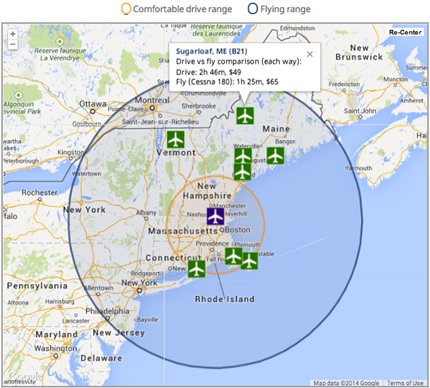Most Americans probably think that private air travel is only for the 1 percent, or more likely the 1 percent of the 1 percent, with the cost of private jets in the millions of dollars. Travel in small aircraft is much cheaper, but still inaccessible to most people due to the time, effort, and cost of becoming a private pilot.
The new sharing economy could change that. Just as Airbnb allows individuals to rent out all or part of their homes, and Uber and Lyft are testing out ridesharing services, two new startups are aiming to bring private air travel to the masses. Airpooler and Flytenow offer a simple service that is basically a teched-up version of the craigslist ridesharing board. Pilots post flights that they are planning to take, which passengers can sign up to share.
Travel in small planes is not only convenient, but can be surprisingly economical for passengers. A flight from Washington, DC to New York City in the 1959 Piper Comanche that I co-own with another pilot would take about 1.5 hours and cost about $125 in gas. Split four ways, the cost comes out to about $31 per passenger, a bit more expensive than a bus but much cheaper than Amtrak.
Airpooler Driving Versus Flying Comparison

Source: Airpooler
Is it legal for a private pilot to share flight costs with passengers? It definitely is as long as the pilot was going to make the flight anyway. In other words, if I’m going to New York I can bring along a friend and split the cost of gas, but if my friend asks me to fly him to New York as a favor then I have to do it for free or not at all. This may sound like bureaucratic hair-splitting, but the rules are the rules. However, apparently they may not apply to flights arranged over the Internet.
FAA Regulations Stifle Innovation
Why would it matter whether or not the flight is arranged over the Internet rather than among friends or acquaintances (or friends of acquaintances)? It’s hard to fathom, but earlier this month the FAA released four pages of bureaucratic mumbo-jumbo that effectively shut down the flight-sharing services. AirPooler plans to fight back, pointing out that the FAA’s logic-defying position relies on an interpretation of a 1963 draft policy that was later reversed.
The FAA has a clear role to play in enforcing their regulations, which it is easy to argue are overly onerous but have the goal of enhancing passenger safety. Flight-sharing sites surely make it easier to skirt rules aimed at preventing private pilots like me from acting as de-facto commercial pilots but without the additional training and oversight. But at the same time, consolidating flight sharing in this way would also make it easier to enforce the rules because the FAA could simply monitor a handful of sites, whereas flight-sharing currently takes place informally over message boards, email, and in person (you can insert your own FAA-NSA collaboration joke here).
When government regulators have tried to shut down operators such as Uber and Airbnb, they have been beaten back by loyal customers who do not want to lose access to services they like at prices they can afford. The new flight-sharing services have not yet gotten off the ground, but anyone interested in gaining access to affordable private air travel should pressure the FAA to back down from its indefensible position.


Commentary
FAA Says No to Private Air Travel for the Masses
August 26, 2014